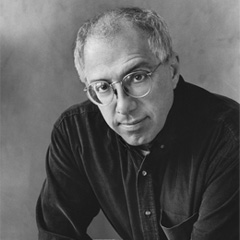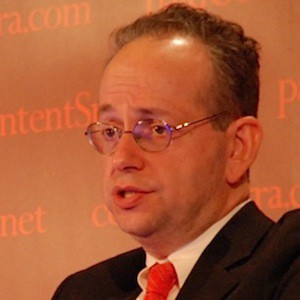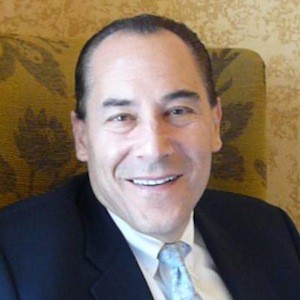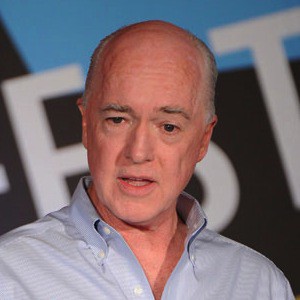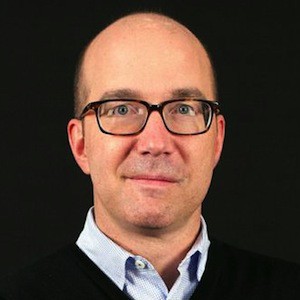John: I’m here at the offices of Medium with Steven
Levy. Steven, why don’t we start off by just telling me what has
been the arc of your career? How did you land at Medium? Where were
you before?
Steven: It’s sort of a long arc, like kicking a long field goal. It
doesn’t get too high. I went to grad school in literature. Didn’t
have any kind of firm plan, really, but I found out quickly that I
wasn’t going to be a scholar. I wouldn’t go for a PhD. I got a
Masters. It was at Penn State. Went there for a while and then came
back to my hometown of Philadelphia.
I just wanted to try being a writer. I did an internship
when I was at Penn State at the local newspaper and went into the
underground newspaper, the alternative newspaper in Philadelphia. I
was writing stories for $10.
After a few months I started writing for the magazines in
Philadelphia – Philadelphia magazine and the Philadelphia
Inquirer magazine. They had a magazine then. I really loved that,
writing for weekly papers and magazines.
I hadn’t realized you had that degree of freedom writing non
-fiction. You could write the narrative there and it was the day’s
new journalism.
My main interest originally is I wanted to be a rock critic
where I’d write about music. I was interested in sports and other
kinds of stuff. Got a job in New Jersey. My first job was at a
magazine called New Jersey Monthly, which was just starting up.
The editor was a woman named Jane Amsterdam who became
pretty well-known to a totally journalism obsessed person, good to
work for.
I met the woman who became my wife there, New Jersey. We
moved together to New York City in 1980. She was writing for the
Village Voice. I started writing for national magazines.
At the end of 1981, maybe, someone who used to be Theresa’s
editor, her name is Susan Long, was working for Jane Fonda’s film
company.
They had this scheme where they would come up with an idea
for a story and pre-option it so they wouldn’t have to bid against
anyone else. It became movie material.
They had this idea that she heard about to do a story about
computer hackers, these people called computer hackers. She asked
me if I was interested to do it, could I have a magazine place to
do it? I had been writing for Rolling Stone. That worked out.
So I got a little extra money to write my first story ever
about computers – I had never touched a computer before – about
computer hackers who, at the time, were basically thought of as
these oddballs.
There was no transgressional definition or connotation
attached to the name there. They were thought as a creepy
kind of loser people, addicts.
When I went out to California to research the story I found
something quite different. These people were really explorers. They
were doing these really exciting things. They were building.
Also, it was the future. I talked to a bunch of people who
had been involved in the early computer industry who were very much
hacker types. I felt the connection instantly to the ’60s when I
went to college. We were protesting the war. My sensibility was
very attuned to that. I found that it was that world.
Some years before I realized that it wasn’t really
interesting to be a rock critic anymore because all the good ideas
were gone, and that really wasn’t the handle to tackle the world
the way it was in 1968, 1969. I was reading Rolling Stone and
Crawdaddy in college.
This was. You could write about anything through the lens of
technology there. It was a great time to begin because on the one
hand you had the trade magazines which money was going to pour in
because the personal computer industry was taking off.
They were moving from hobbyist writers to professional
writers. They wanted to know who is a professional writer who’s
interested in this stuff? Then for magazines like Rolling Stone and
other places that I was writing for they were interested in
exploring the subject and wanted to know someone that they had a
relationship with that could bring them a story to their standards.
I worked both ends of that. I did a column for a magazine
called Popular Computing in the early ’80s and I was writing a
lot of stuff for Rolling Stone. I wrote the first story about the
Macintosh.
I was embedded in that team a little. I wrote a story when
the thing came out, spent time with Steve Jobs when the Macintosh
was being readied.
As I went on, I spent more and more of my time doing that.
John: Excellent. Excellent. This was sort of new country. Did you
ever think that it would change from that boast that technology
could change the world – it was a boast, prove it – to that
happening? What eureka moments did you have?
Steven: I think one was the Macintosh. Right after my first story
for Rolling Stone I came back and I said to my girlfriend – now my
wife – “We’ve got to get these things there.” At the time, people
were debating, writers were debating.
The big debate was should you get one of those things with a
TV screen on your desk or should you get an electronic typewriter,
which was a little less radical way to get into something where you
wouldn’t have to use whiteout if you made a mistake on your text,
on your drafts there.
I said, “We’ve got to go get an Apple computer” and we did.
We spent a lot of money and got two Apple computers. The monitors
and disc drives and a dot matrix printer which we shared.
It cost an amazing amount of money and we needed training
to use them. We went there. It was hard, but then I saw the
Macintosh and I realized this really is moving out there.
Intellectually, I always did feel that this is the way of
the future, but it was hard to actually feel it in your heart that
it was going to happen. I remember in the mid ’90s, the early ’90s
particularly, after Mosaic came out and people were looking at the
Internet.
I was a big advocate. I saw right away this is huge. Markoff
was first but not too long after that.
I would go and talk to people, and I even did some
consultancies. I went to the big paper chain in Minneapolis.
John: “Star-Tribune” yeah.
Steven: Yeah. All kinds of people there. They would bring in people
like me to basically say the same thing their people in the
trenches were saying. They wouldn’t listen to those people.
They had some people that knew what was going on, but they
wouldn’t listen. I showed them, here’s a website. You could have a
website, and people will come to you.
I said, “100 million people are going to be on this.” In my
head I would think, ‘That’s a lot of people.’ It was the one thing
where it was an incredibly hyped thing, where the hype wasn’t
enough.
You could not over-hype the Internet, no matter how hard
you tried. Some people tried greatly, but there was no exaggeration
you could make that the Internet didn’t exceed later on.
John: Yeah, no, absolutely. How did the consultancies, when you
went out to meet companies…? Did people in the trenches…? What
was the mindset of the business leaders you were consulting with?
Steven: They were curious. They didn’t really see this as something
that would put them out of business. They were just saying, “This
is something we should be interested in,” and I would say, “If
you’re not doing this, your competitors will.”
It’s pretty tough to envision exactly the way the thing
took shape there. You could see the outlines of it. About any of your
interests, there would be something there.
Steven: So even though I didn’t think they would find it that
easily, when Alta Vista came out, people were excited. We can find
stuff now but Google surprised us all with how easily you could
find that.
But t was very difficult just to see Google there, to
immediately jump ahead to all the implications of that.
Google, again, looking back, that was another one of the
turning points there. Another part of the turning points is, as I
got into it more in the ’80s, I got actually into looking at the
underlying technology of it and what was happening there, Moore’s
Law, the way of thinking it represented.
Also the politics of it. When I did my first book,
“Hackers,” I was really struck by how much the issues of this age
were political issues. Again, it was already tied to the ’60s, and
that sensibility was in Hackers.
It took a number of years for people to pick up on it really.
Then, one of my great delights is that people…now it’s really
known for that stuff, as opposed to the stories I told alone.
Oddly, my second book was not about technology. It was
about a true crime story I always been interested in. I was sort of
hedging my bets, maybe. Thinking, should I be known only for this?
Then after that, I thought, yeah, yeah, this is interesting
enough. So my third book was Artificial Life, which was
really about creating biological processes in the computer.
I had, besides the consumer story, the business story. I’m
interested in almost the science of it and the effects of computer
technology on humanity.
It’s all tied together there. Even though if you look at my
books, they sort of zig and zag within the field. I just do think
it’s all one piece and a lot of people ask me, “Well, when are you
going to write a sequel to Hackers?” I always like, “I’ve been
doing nothing but sequels to Hackers.”
John: It’s fascinating that what originally attracted you to
Hackers, what you mentioned, was very much a ’60s sensibility. Over
the course of the last 30 years, technology has almost become like
banking, in the sense that the amount of wealth flowing into that.
How do you trace that arc? Is that sensibility that you
originally saw still extant in the technology business?
Steven: The third part of Hackers was just dealing with that issue.
I knew the money was going to pour in, and what happens when the
hackers get rich, there? I grappled with that.
I had somewhat of a more pessimistic viewpoint than I
needed to. I think actually there was a nice accommodation to
hackers being rich. There was a way you could still be a hacker and
have that spirit and be locked into that mindset and be a
billionaire.
I think people like Mark Zuckerberg and Larry and Sergey at
Google, they’re good examples of that.
John: What is the effect…? Did you feel an effect on you, on
covering a cohort in industry where you’re watching people get
fabulously wealthy. How did you react to that?
Steven: I don’t know. I never really felt, oh my god, I’m missing
out there. The fact is, I’ve been, for a journalist, pretty well
compensated.
The mid-’90s, after a long time freelancing, I took at job
at Newsweek. I did that and I wrote books, and I have not been
needy.
I’m not rich. I’m not Mark Zuckerberg or even the many,
many people who have 20 to 30 million dollars in wealth.
I never thought I wanted to do this stuff that you would
have to do to that. I’m doing what I want to do, just as those
other people are lucky enough to do what they want to do and be richer
than me.
I feel that it’s pretty good for me to be doing what I want
to do and have a pretty good income.
John: Yeah. Trace the arc, if you would, of what your colleagues,
all the journalists, you start off as a small tribe, almost,
covering this industry. Now there are masses of people covering it.
How has that culture between journalists changed?
Steven: You’re right, in the ’80s, it was a small tribe. There was
this thing — I don’t know if this has come up — in New York
called the Digital Deli Group, the lunch group, which was…I have
mixed feelings about it.
It was simply because this one guy said, “Oh my God,
there’s a bunch of writers in New York who cover technology. We
should get them together.” You could put them all at a table, at
least the ones in New York.
The group there, it was a relatively small band there, but
you know what? I just don’t think, from where I am, inside this
world, it doesn’t seem much different.
It seems to me there has always been sort of the same
relatively small group there, masses of people who also write about
it, who just aren’t plugged in to the echelon of coverage, which is
not all that much bigger than it used to be.
John: You mentioned Digital Deli. Markoff mentioned something to
me, the “Justice League of America”?
Steven: I know how he tells the story.
It was one of these conferences in Arizona, and we met and
I think maybe Kara Swisher might’ve been there.
It was the time Kara had not built her reputation to be one
of the top people, which of course she is now. The idea that we
could get Markoff and Walt and me and a couple of other people who
were the big names at the time there.
We would have our website and we would do that. I joked it
was Justice League of America and then Superman and Batman and Aqua
man…
…and all that and Wonder Woman I guess.
We all had this little meeting. Dan Gillmor I think was a
part of it too. No one wanted to take the step, really, of doing
this. We’re journalists, we’re not business people.
We said, “Well, let’s all keep it quiet.” Then of course,
about 10 minutes later Kara is in the bar talking to a VC. Maybe
it was Jim Breyer or someone.
John: Markoff said she talked to Breyer.
Steven: She told the idea there. He like on a napkin wrote down
something like $40 million and 25 percent and Kara looked at it and
said, “That percentage is too high.”
I don’t know which is crazier, the idea that just based on
this meeting that it got this multimillion-dollar valuation or that Kara
thought it wasn’t enough. You know?
John: What’s fascinating is that in the arc since then we’ve seen
a transition in the last 15 years where the journalists are
becoming their own brands, separate from the institutions.
Steven: This was something that I was talking about in the mid-
’90s. I had a little slide because I was writing a column before I
got to Newsweek.
I was writing a column for “Macworld”. Everybody would
always tell me, “Oh, you’re the reason I buy Macworld, Steve.”
“I read it just for your column.” Macworld was five dollars
an issue or something or even if you subscribed to it it’s a couple
of dollars an issue. I’m thinking well, based on that,
what if I charge 25 cents to write my column?
I could sell directly and I had the thing there. I’d make
more per column and go direct. That’s super hard to do, just to go
off on your own and do that and find an audience there.
People figured out and after, it really took somewhat of a
collapse of the traditional business model to make that plausible
and how things are itemized out. It’s still a lot of work.
Even when Kara and Walt did that they, basically for the
first 10 years they worked for the Wall Street Journal. That’s a
big set of training wheels there.
John: Absolutely. Does this transition …
….. becoming a brand, does it allow you to keep
your distance from, that journalistic distance from what you’re
covering or does the access overwhelm everything else?
Steven: What’s the difference between being a brand working for
Sports Illustrated and being a brand who’s in charge of
Grantland or something. If you’re a brand you’re a brand.
If you’re well-known on your own right, the issues of
access are stable no matter what. The only thing that would be
different is if you have partnerships and relationships
business-wise with some of these places there.
I’ve found that one thing which, it wasn’t so much Newsweek,
but at Wired I was constantly being called on to bring in my
sources for speaking events.
I never was all that happy about that because I always
feel that you have a certain amount of capital with these people
there. I prefer to use my capital to get stories rather than
conference appearances.
John: Talk a bit about the difference in the audience, too. You
mentioned while writing for MacWorld people said, “I used to buy
because of your column.”
That audience when you started out in Philadelphia used to
reach you by mail once every 10 days. Now, it’s more intimate…
Steven: …or not. They’re not. They don’t reach me at all. If you
got three letters for a story in Philadelphia magazine, they’d print
them. It’s a lot.
The relationship is different, a lot of it is noise. It’s
interesting. It’s interesting to read Twitter and I look at the
comments on it. I find that the biggest difference is when you
write a book.
Before the process of readers getting in touch with an
author used to be every six months your publisher would send you a
small bundle of the people who wrote to the publisher with a
question or something like that.
Now, bang, instantly you get notified. If you’re like me
that you put your contact on your website or whatever it’s right
there. That’s dramatic. You could also monitor what actual readers
think of your book.
On Twitter and other things and they blog about it.
Steven: …which I think is great. I think by and large you get a
much better picture of how your book is being received from readers
speaking to their peer groups than you do from book reviewers who
by and large don’t do a very good jobs of reviewing books.
They have all sorts of other aims in doing a book review,
saying, “Here’s my take of the subject.” “Here’s my
chance to settle a score or whatever.”
John: They’ll be new wave in media and on other sites and
apps. You will be able to tell how many readers start and how many
readers finish that story.
Is that daunting, because we never knew?
Steven: Yeah. I know. Well, Medium is particularly interested in
that. We measure by big metric how much time people spend reading
it.
You could see who’s actually reached the end. That’s
interesting. Now that I’m running this site, I’m trying not to go
overboard on…. It’s a fragile thing when it
starts out.
If I publish an essay by one of my writers, one of my
contributors, and I think it’s a great essay but it doesn’t get a
huge readership, I don’t want to overreact to that.
There’s one in particular I published the first week. I
thought it was a really wonderful essay by one of my writers and it
didn’t get a giant response.
Then someone at Google told me “That was the greatest
essay, I sent it to other people.” It’s kind of interesting there.
John: I think you’re right, you have to guard against that
over-reliance on too much.
Steven: It’s interesting. We’re sort of hard core here at Medium. We
don’t chase traffic. We don’t do things to inorganically build up
our numbers there.
That makes it sort of an outlier. It’s tough to make a
comparison to someone who’s trying every trick in the book to drive
traffic there when we’re trying to do things old school.
By saying it’ll be our content. It’ll be what we do, the
quality of what we do that brings people to our door.
John: Esther Dyson likes to comment that she thinks that readers
have to become smarter in a world of info-besity, where there’s too
much out there.
There has to be a curve to the readers’ awareness and where
the reader looks for information. Do you think that is coming? is
nascent? Where do you…?
Steven: I think there is going to be a reaction among people., a
realization that they’re spending too much time getting lured to
stuff, which is candy and not nourishing.
I think the places like Facebook and other places, Google,
are recognizing this and pondering ways to realize that it’s better
for everyone to have an ecosystem where quality rules, as opposed
to distraction and junk.
John: Junk, yeah. One of the riddles, of course, is how do you
pay for quality? You’re testing one model here and that still isn’t
known, or…?
Steven: I guess we’ll find out through sponsorships or whatever. I
don’t know. If you go to native advertising properly labeled and
all, we’ll see.
I think the one thing we have here, and I think you almost
need to have this these days, is the revenue is important but you’re
advantaged if revenue isn’t the only thing you bring to your company
here.
In Medium, the reason why these hubs like mine are good, not
just in of themselves but for the whole thing, is we’re going to draw
readers and writers to the platform, the overall platform.
The overall success of Medium is not going to depend on
whether Backchannel or Cuepoint (the music hub) or any of these
other things do well, but how well it is in fulfilling its mission
of bringing out ideas in general, making it easier to express them
there.
Our success will help that larger picture. I don’t think
they want to lose money on us and they’d like to make money on us,
but I think if we do OK and help that bigger mission, then it’ll be
a really good thing.
John: How would you say among the journalist
covering tech, was it more collegial or competitive? How would you
describe the ecosystem around it?
Steven: I think it was generally a collegial group, I really do.
Even when we’re competing for the same stuff, at least to our faces
it’s collegial.
Everyone’s nice to me, but then someone at Facebook will
say, I get a lot of complaints about giving you these scoops.
John: There’s that. How do you think journalism writ large has
done covering the last 30 years? How do you
think?
Steven: We’ve had our successes and shortcomings. By and large, you
could say there are aspects of the industry which are fawning, but
there’s aspects that are like knee-jerk critical. Overall, I think
people are informed on the issues.
Everyone knows about the threat to privacy, all the stuff
at the NSA, people are shocked… But you know what? People have been
writing about this for years.
Wired did a huge story by James Bamford about the data
center in the desert that he said was going to do every single
thing that Snowden later had.
It just happened that here was a document, a lot of
documents, which put it in black and white.
Well if you go back and read that James Bamford story, you can
say, “Yeah, OK, here’s the proof of that, which people shrugged off
when it came out there.”
It’s difficult to filter through what could come about and
what couldn’t come about, in part because it is so difficult to
know what’s going to happen there. You’re trying to catch a target
with a non-linear trajectory. It’s really hard.
Even to go back five years, you could make some generalized
predictions about directions and generalize that, but to actually
know what kind of stuff is going to be popular in five years, you
don’t because there’s going to be stuff that’s enabled two years
from now that you couldn’t figure out there.
John: Would you argue that the traditional news industry should
have seen this disruption coming?
Steven: Of course they should have but they were not equipped to
see it. It just could not happen because of the way the business
worked.
Who wants to look at something that tells them that the
model they’re making money on is like climate change. By the time
you do something about it, it’s too late.
They just did not understand how quickly and thoroughly
things were going to change. The writing was on the wall. They
didn’t want to read it and they couldn’t read it. How could they
reconstruct that?
In Newsweek I would tell anyone who would listen, “What we
should do is give all our content to five people in Silicon Valley
and let them invent something,” but that was never going to happen.
Newsweek thought it was a pioneer because they jumped on
the CD-ROM bandwagon. They would do these things…there was a big
fight in the mid-’90s. No one really wanted to hear what I had to
say but I was griping a lot about it.
We had a choice on our online thing whether we would do a
website or develop on Microsoft’s Blackbird.
And of course they picked Microsoft because Microsoft was a
good partner… And then a couple of years later, of course, they had
to pull the plug on that.
John: Why was that in some of the companies? Others have
mentioned, too, that your voice was sometimes heard louder outside the
company than within the company.
Steven: No one wanted to hear what technology reporters had to say,
no one.
John: Why?
Steven: I had a good relationship with Donnie Graham. He never sent
stuff down to me and said, “What should we do, Steven?”……… I had a
terrific relationship with him.
John: But you are optimistic about journalism.
Steven: Yeah. It’s interesting. I’m optimistic and this field in
particular. I lived for Newsweek and a lot of people took those
buyouts or had to leave.
Newsweek now, it’s still a viable operation but not really
Newsweek. It just has a name of Newsweek. Basically, my institution
is gone. It’s a shocker.
Who would have thought, even when I left, I thought, “this
amazing institution,” would vanish. It is gone. A lot of
people just did not find their footing or went into different kinds
of businesses or things like that.
I was lucky because the field that I write about there’s
this big demand out there. I’ve been in the Huffington Post
newsroom. Giant newsroom, right? 300 people there.
I’ve been in Business Insiders newsroom, again, desks and
desks, journalists writing, working there. There’s all these other
brand new newsrooms that didn’t exist before, that are hiring
journalists today.
The job might be a little different and the approach might
be more demanding, but they’re journalists. This field isn’t dead.
It’s like new institutions rising there and they’ll be
just as sclerotic in their own sense in a few years, it’s just as well.
Another place will come up.
John: One last question. Some people say we as journalists got
too much into celebrity. We love covering Apple, we don’t cover the
anthropology as much as we should have. We got Hollywood-like.
Steven: I don’t know. I’m pretty much into anthropology.
Apple, in particular, can get a little extreme but to me
I would say it’s not that outrageous. To me, this is, among other
things, a giant cultural story.
IBM is a big, important company. It makes a lot of money
but it is not really a company that is co-evolutionary with the
culture like Apple is.
When you’re covering Apple, you really are covering “The
Big Story.” It’s like saying in newspapers…Congress. You read
about Congress a lot, don’t you, but when we’re talking about laws
and whatever, the nation’s covered. You can’t avoid Congress.
That’s a big central story.
The big companies like Apple, Google, and now Facebook,
they’re the companies that I spend a lot of time with because
they’re not only important from an economic sense or a technology
sense, but a cultural sense.
John: Wonderful. That was great.
